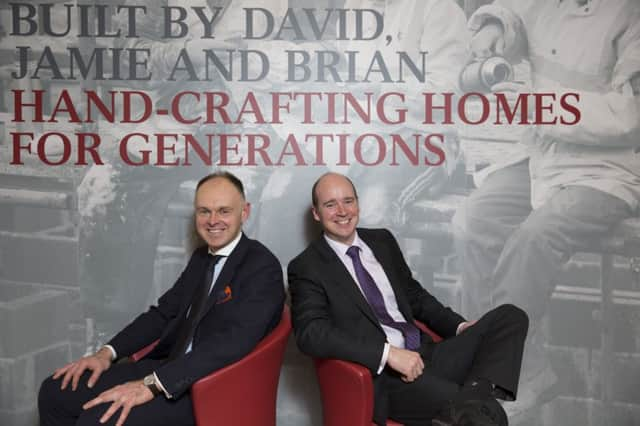Monday Interview: Andrew and Ross Mickel


Andrew and Ross Mickel are, therefore, quite rare individuals in the world of business. The cousins both trace their lineage back to Colonel Andrew Mickel, who 90 years ago co-founded the Mactaggart & Mickel housebuilding group where his great-grandsons work today.
From the firm’s headquarters in Glasgow, Andrew oversees the homes division as well as land and planning issues. Meanwhile, fellow board director Ross is in charge of the timber systems division, which employs 31 people in Bellshill supplying prefabricated components used by Mactaggart & Mickel and other builders.
Advertisement
Hide AdAdvertisement
Hide AdThey and Ross’s father, chairman Bruce Mickel, make up half of the board at a group owned by nearly 20 shareholders spread across extended relations. Stewards of an operation only now shaking off the last vestiges of the recession, they have exploited the interwoven nature of a family business in their quest to bring Mactaggart & Mickel back to financial health.
“One of the joys of a family company is you can ask your fathers about a particular situation, or an idea you might want to try out, and they can tell you if it is something they have looked at before,” Ross says.
“Every generation has their own challenging times. As my own father keeps telling me, I will go through at least two more recessions during my time here.”
It’s a sobering thought given the length of the last downturn, which took hold not long after Ross returned to the family fold from five years in London with Field and Lawn Marquees.
After decades as a straightforward builder of homes around Glasgow and the south-west of Scotland, the group reached a zenith of 274 completions during the year to April 2008 before the “guillotine came down” on the housing market. Completions tumbled by more than half in the following 12 months before reaching their lowest at 109 for the year to April 2010.
The impact on Mactaggart & Mickel was predictably brutal. The company was forced to let more than a third of its employees go. Those who remained in a job spent nine months working five days a week for only four days of pay.
“There are many who are fathers and sons within out staff as well,” says Andrew, who joined the company in 2000 after three years as a surveying consultant with Caws & Morris in London. “It was like breaking up the family.”
The first major breakthrough came in 2009, when the company signed a fixed guaranteed contract to become part of the City Legacy consortium with CCG, Cruden Homes and Malcolm Construction. The award-winning partnership initially housed 6,500 competitors and officials during the 2014 Commonwealth Games, and is now providing affordable housing in Glasgow’s East End.
Advertisement
Hide AdAdvertisement
Hide Ad“We were certainly grateful for that,” Andrew confides. “Not only was it good for the city of Glasgow, but it also probably saved jobs here.”
A gradual rise in home completions was augmented by the new contracting division which delivered 121 units during the year to April 2014, taking the total number of completions to 254. This and other new lines of business produced a surge in profits to £8.1 million on sales of £58.5m, a result Mactaggart & Mickel expects to roughly match in the current year to April.
Diversification has included a move into commercial property, with the group building retail units for the likes of the Co-op, Sainsbury’s and Tesco.
The timber systems unit started producing components used in Mactaggart & Mickel houses in 2007, and by 2009 these were made available to other builders. The latter has grown to the extent that external turnover in timber systems recently surpassed the value of internal sales.
“Working with other builders has allowed us to see how other people do things,” Ross says. “It has been a real eye-opener to see how other things work, or don’t work.”
Future developments include the imminent launch of an investment fund worth in the region of £5m to £10m. It will not be limited to Mactaggart & Mickel’s core business of property and house building, as employees are being invited to pitch for backing for any kind of promising idea they might have. That is why we find it quite an exciting time for us – it is a blank canvas,” Ross says. “It is not a massive game-changer, but it is another string to our bow.”
The plan is to pass this diverse operation on to the next generation, which currently includes seven children all under the age of nine.
The hope is that at least a few of them will want to join the family business, but as was the case with Andrew and Ross, no one will be pressed into service.
Advertisement
Hide AdAdvertisement
Hide Ad“In the short to medium to longer-term there is not going to be an issue, unless something very unexpected happens,” Ross says of the years both he and Andrew have left in their working careers.
SUBSCRIBE TO THE SCOTSMAN’S BUSINESS BRIEFING